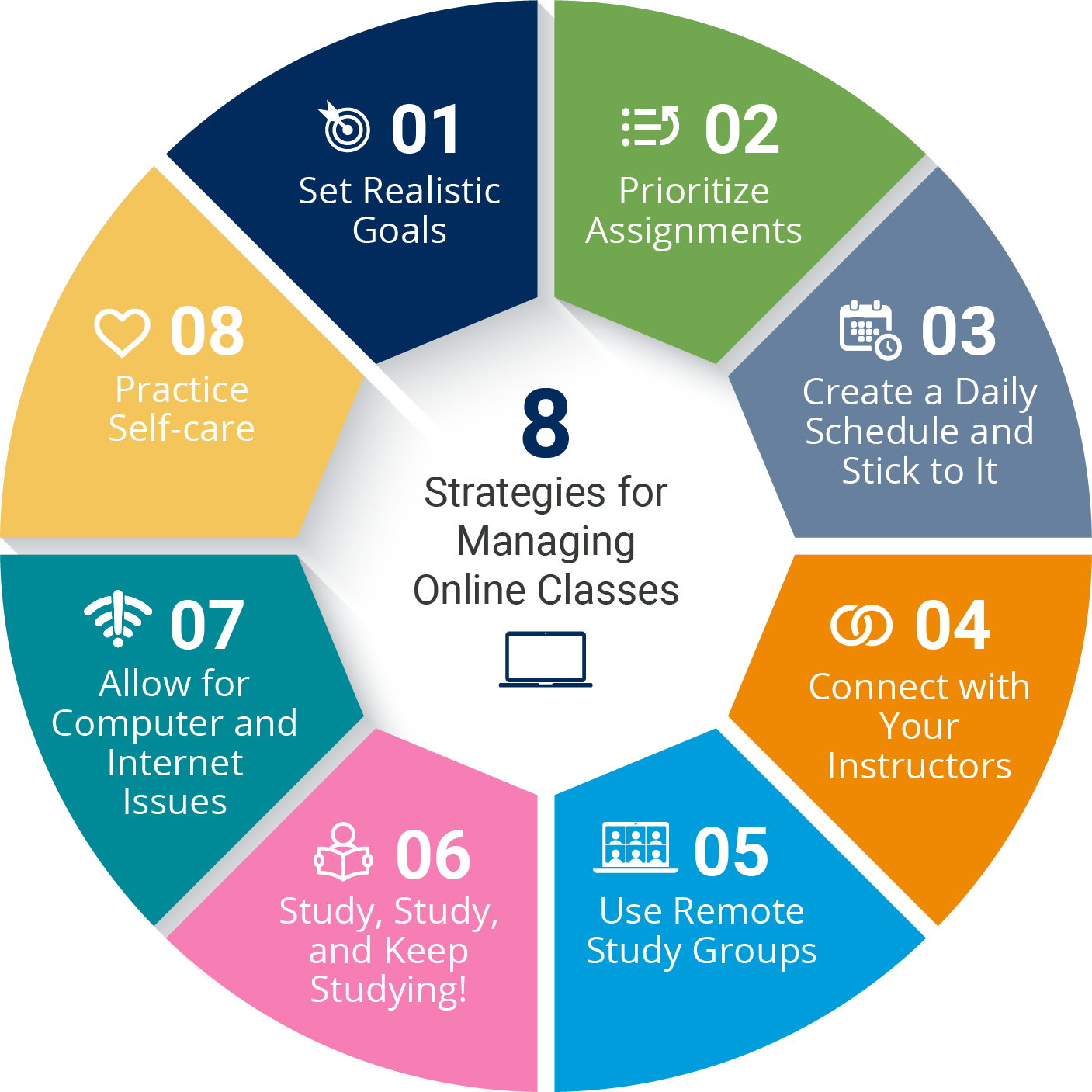Online or In-Person Classes?

Helpful insights when deciding on which type of college class to take.
With so many college courses now being offered online or hybrid, it can be difficult to decide between one of these routes or the traditional in-person approach. Before you make a decision, consider the following thoughts and ideas.
Online Classes
Pros
Both pros and cons to online learning exist, and are unique to each individual. Some of the pros to online learning consist of the following:
- Flexibility
- Accessibility
- Work-life balance
There are different styles of online classes. Some require students to log in at a set time for a virtual lecture, while others allow students to choose when they log in and view the required class materials. The latter may consist of pre-recorded presentations or videos/content accessible anytime on the internet; the former may be more structured. Both allow for an at-home learning experience, which is a critical perk for many students with jobs, families, transportation barriers, etc.
For those who enjoy traveling, online learning allows for easier trip and school coordination, as online classes can often be taken along for the ride wherever there is internet. Classes that do not require virtual lectures are especially helpful when considering trips with varying time zones. Before signing up for an online class, check for classroom expectations to ensure you understand what kind of time commitments you may be asked to keep.
While students may miss out on the opportunity to network in person with their fellow peers, online learning provides the unique opportunity to connect with individuals that may otherwise be inaccessible. Many students cannot schedule library group meets because of personal life obligations; others may not even live in the same state. Some online course projects may require team collaboration, but this is made possible through the use of email, Zoom, etc., allowing for differences in time zones and meeting locations. Online learning, therefore, brings students together that otherwise may not have had the chance to meet and share ideas. In addition, students who do not feel comfortable voicing their ideas and opinions in front of others may find the online learning experience more comfortable, as face-to-face interactions can be limited.
Cons
Cons to consider before making the choice between online or in-person classes include the following:
- Distractions
- Technology issues
- Lack of social interaction
Depending on the current life circumstances or career of the aspiring student, a large amount of time per day may already be dedicated to looking at a screen. Increasing this amount of time for classes may cause fatigue and boredom. With boredom comes temptations, such as social media or other digital entertainment. High amounts of self-discipline and time management are needed from students who take the online route, so that these distractions are kept in check.
Another potential downside is unexpected issues with accessing technology. A student can be fully tech savvy and competent in using online school platforms, but there is no escape from an internet outage, amongst other unplanned incidents. There is also the possibility that some computers or laptops may not be capable of running newer or larger software required for online classes. Students should ensure that they know ahead of time if their technology is capable of running the needed software. Reaching out to the professor, or reviewing software requirements online, is best practice before signing up for classes.
There is also the concern that students may struggle if they don't have an in-person connection with their peers. Many individuals have grown accustomed to this, especially with the rise in fully remote or hybrid jobs. However, for those that thrive on being an extrovert, or who enjoy mixing work with pleasure during after-work/school mixers, online learning could pose a problem.
Check out the article of reference here.
In-Person Classes
Pros
Just like online classes, there are pros and cons to in-person learning as well. Consider the following benefits:
- Structured Routine
- In-Person Training
- Collaboration
In-person classes require students to meet for lectures at set times, creating a level of accountability and punctuality. This can help set the healthy habit of meeting deadlines and working under pressure in a lesser-known environment than the living room. The requirement to attend school in a lecture room can offer a space away from distractions, specifically set aside for learning.
Some certifications and degrees require in-person training during labs, clinics, etc. These can simulate real-life scenarios, instead of just watching videos or reading articles about similar situations. Students also have the opportunity to learn from others that may be undertaking the same tasks. Instead of working solely based on their own understanding of the assignment, students can observe what others have done, and learn new techniques they might otherwise not have tried.
Attending in-person classes opens the door to meeting new people, and allows for collaboration opportunities with both peers and professors. While many professors are open to virtual meetings during office hours, some students prefer face-to-face interactions. This can alleviate email miscommunications, and save time by asking questions and receiving answers upfront.
Cons
The following may be considered cons to in-person classes:
- Inflexible
- Less Cost-Efficient
- Public Speaking
As previously mentioned, if a student is already in the workforce, caring for a family, etc., in-person classes might be difficult. Instead of collaborating via video chat, groups often choose to meet at their school before or after class. This means additional time commitments away from home, on top of lectures and labs that may already be several hours long.
In some cases, in-person classes don't provide options for online books. This means purchasing paperbacks, which can at times be more expensive. In addition, students may accrue campus charges from amenities such as room and board, campus gyms and clubs, on-site restaurants, etc.
There may be times when public speaking is required during in-person classes, something many students struggle with. Many individuals are too afraid to even raise their hand and ask questions during a lecture. It's more likely that these students will miss out on the opportunity to gain clarification, making their school experience more difficult. Aspiring students should consider if the fear of public speaking will hinder their ability to learn, or if it's a skill they'd like to acquire through practice. Confidence when speaking in public can come in handy inside and outside the classroom.
Check out this article for insights on traditional learning, and more.
Leaning toward online classes?
Just because online learning may allow for a more flexible schedule, this doesn’t mean it’s the “easy” route. In some cases, it can be more difficult, depending on your learning style. Check out our "8 Strategies for Managing Online Classes" article and video for tips on how to be successful. A brief overview of the strategies is shown in the chart below:
Considering the traditional in-person approach?
Recognize that it’s not only important to attend, but to actively participate. As the old saying goes, you get out of something what you put into it. Being present isn’t always enough; sometimes it takes seeking out knowledge and working to apply what you learn. Check out our tips to a successful college experience, outlined below:
- Participate and Engage in Class
- Organize and Use Time Wisely
- Get Involved
- Meet with a counselor for personal and career counseling
- Set, Seek and Meet Goals
- Take Effective Notes
- Study Effectively
- Develop Self-Awareness, Self-Management, and Self-Discipline
- Practice Wise Money Management
- Take a college success class
- Use Academic Coaches
Summary
Education is now more accessible than ever, and available to a larger student population as a result. With the rise in popularity of online classes, many students who otherwise would have been unable to make the time commitment or commute can now attend from home and receive a quality education. For those who prefer the traditional campus class approach, this experience can be equally rewarding and comes with its own benefits.

